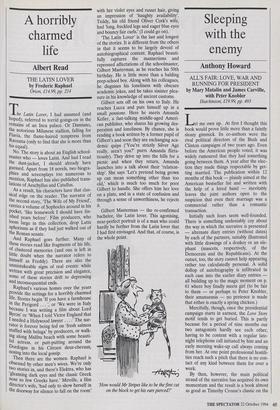A horribly charmed life
Albert Read
THE LATIN LOVER by Frederic Raphael Orion, £14.99, pp. 214 II•mmumr The Latin Lover, I had assumed (and hoped), referred to torrid goings-on in the remains of an Inca palace. Or Damiano, the notorious Milanese stallion, falling for Flavia, the flame-haired temptress from Ravenna (only to find that she is more than his equal). No. The story is about an English school- master who — loves Latin. And had I read the dust-jacket, I should already have guessed. Apart from 18 novels, two biogra- phies and screenplays too numerous to mention, Raphael has also published trans- lations of Aeschyllus and Catullus. As a result, his characters have that clas- sical edge on the reader. The narrator of the second story, `The Wife of My Friend', carries a volume of Sophocles around in his pocket, `like homework I should have fin- ished years before'. Film producers, who loom large in this collection, drop Latin aphorisms as if they had just walked out of the Roman senate.
And Raphael goes further. Many of these stories read like fragments of his life, of clustered memories (and one is left in little doubt when the narrator refers to himself as Freddy). There are also the unmistakeable signs of real events: while written with great precision and elegance, some of these stories drift to depressing and inconsequential ends. Raphael's various homes over the years provide the settings for a horribly charmed life. Stories begin `If you have a farmhouse In the Perigord . . . ', or `We were in Italy because I was writing a film about Lord Byron' or `When I told Victor England that I needed a Holywood lawyer .. ..' The nar- rator is forever being fed on `fresh salmon stuffed with beluga' by producers, or walk- ing along Malibu beach with some beauti- ful actress, or putt-putting around the Dordogne in his Citroen deux-chevaux, nosing into the local gossip. Then there are the women. Raphael is obsessed by other men's wives. We're only two stories in, and there's Elektra, who has `gleaming dark eyes and the classic Greek nose so few Greeks have.' Mireille, a film director's wife, `had only to show herself in the doorway for silence to fall on the room' with her violet eyes and russet hair, giving an impression of `haughty availability'. Teddy, his old friend Oliver Cork's wife, had long, freckled legs and eager blue eyes and bouncy fair curls.' (I could go on).
`The Latin Lover' is the last and longest of the stories. It is different from the others in that it seems to be largely devoid of autobiographical content. Raphael beauti- fully captures the mannerisms and repressed affectations of the schoolmaster, Gilbert Masterman, as he reaches his 50th birthday. He is little more than a balding prep-school boy. Along with his colleagues, he disguises his loneliness with obscure academic jokes, and he takes sinister plea- sure in his knowledge of ancient customs.
Gilbert sets off on his own to Italy. He reaches Lucca and puts himself up in a small pensione. Here he meets Amanda Keller, a fast-talking middle-aged Ameri- can publisher, who shares his growing des- peration and loneliness. By chance, she is reading a book written by a former pupil of Gilbert's and soon they are exchanging aca- demic quips ('You're strictly Silver Age really, aren't you?' purrs Amanda flirta- tiously). They drive up into the hills for a picnic and when they return, Amanda launches into a talk about their `relation- ship'. She says `Let's pretend being grown up can mean something other than too old,' which is much too much for poor Gilbert to handle. She offers him her love on a plate, and in a state of confusion and through a sense of unworthiness, he rejects it.
Gilbert Masterman — the re-confirmed bachelor, the Latin lover. This agonising, near-perfect portrait is of a man who could hardly be further from the Latin lover that I had first envisaged. And that, of course, is the whole point.
How would Mr Stripes like to be the first cat on the block to get his ears pierced?'










































































 Previous page
Previous page